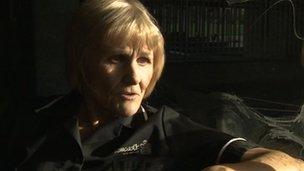Living wage for Newcastle City Council staff
- Published

Marlene Brownlee estimates she will be about £70 a week better off
Thousands of workers at a North East council have seen their pay packets grow after the town hall decided to give them a living wage.
Newcastle City Council is now giving all workers a minimum of £7.20 an hour - more than a pound above the national minimum wage of £6.19 an hour.
One of those benefiting is cleaner Marlene Brownlee, who has worked at Newcastle's civic centre for 15 years and estimates she will be about £70 a week better off.
She said: "It'll make a big difference because obviously you try to cut down on your food shopping, on your bills.
"That little bit extra - well I'm saying little, it's a lot really - is excellent, for me and everybody else at the council."
Economy boost
The council says paying the living wage to staff will cost it around £1m extra every year, but that this will be met through "internal efficiencies", including by employing fewer people in management positions.
But it also claims that it will bring economic benefits.
Councillor Joyce McCarty, Labour deputy leader of the council, said: "Research that's been undertaken nationally tells us that money that's paid to less well off workers ends up in the local economy and if we're giving people an extra £1,000, or thereabouts, in their pay packet each year that money will be spent in local shops."

Joyce McCarty believes the move will boost the economy
She added that increasing workers' pay often led to them taking fewer days of sick - saving the council money.
That view is shared by KPMG which recently undertook a major study of the effects, or potential effects, of both the public and private sector paying a living wage.
Mick Thompson, from KPMG, said: "The statistics and evidence do support the view that it makes people more comfortable in the job longer term; they're more committed to their employer, they get into work on time, they'll be much more full of energy and actually retention, sickness, all these sorts of stuff that build towards productivity and service lines to your customers - whatever form of industry you're in - actually benefit the business as well as the individual."
Cash pressures
Among councils in the North East, Sunderland City Council is also considering adopting a living wage and is consulting with staff and unions.
Durham County Council is about to review its wage structures and says after this it might look at adopting a living wage in future.
Private firms are also being urged to adopt a living wage and a national campaign is being run urging all employers to pay a minimum of £7.19 an hour to staff, or £8.30 in London.
But the Federation of Small Businesses says that many firms it represents would like to pay staff more but are having to use much of their surplus cash paying National Insurance for workers, VAT to the government and business rates to councils.
See more on this on the Sunday Politics, BBC One, Sunday, 11:00 GMT.
- Published29 October 2012
- Published29 October 2012